Graeme Thomson
Sir Graeme Thomson GCMG KCB (9 August 1875 – 28 September 1933) was a British civil servant in the Admiralty, who served as a colonial civil servant and then governor in several British colonies.
Sir Graeme Thomson GCMG KCB | |
|---|---|
 | |
| 26th Governor of British Ceylon | |
| In office 11 April 1931 – 20 September 1933 | |
| Monarch | George V |
| Preceded by | Bernard Henry Bourdillon (Acting governor) |
| Succeeded by | Francis Graeme Tyrrell (Acting governor) |
| Governor of Nigeria | |
| In office 13 November 1925 – 17 June 1931 | |
| Preceded by | Hugh Clifford |
| Succeeded by | Donald Charles Cameron |
| Governor of British Guiana | |
| In office 4 April 1923 – 31 August 1925 | |
| Monarch | George V |
| Preceded by | Wilfred Collet |
| Succeeded by | Cecil Hunter-Rodwell |
| Personal details | |
| Born | 9 August 1875 |
| Died | 28 September 1933 (aged 58) Aden |
| Citizenship | British |
Admiralty clerk
Graeme Thomson was educated at Winchester and New College, Oxford and joined the civil service in 1900, being assigned to the Admiralty.[1] Some years before World War I, following the Agadir Crisis in 1911, he asked about the plans to get the British Expeditionary Force to France in the event of war and found they were scanty. He and Alfred Faulkner were then permitted to compile a register of ships suitable for requisitioning as transports, after they had completed their normal work each day. This they did, thus enabling the British Expeditionary Force rapidly.[2]
Director of Transports
Shortly after the outbreak of war, he received extremely rapid promotion, from a superintending clerk to Civil Assistant Director of Transport in September 1914 and to Director of Transports at the Admiralty in December,[3][4] succeeding Admiral Savory.[2]
Winston Churchill praised him after stating over a million troops had been moved:
The credit for these arrangements lies very largely with the head of the Admiralty Transport Department, Mr. Graeme Thomson—one of the discoveries of the War, a man who has stepped into the place when the emergency came, who has formed, organised, and presided over performances and transactions the like of which were never contemplated by any State in history. Indeed, so smoothly and unfailingly has this vast business, the like of which has not been previously witnessed, been carried through, that we have several times been compelled to remind the soldiers whom we serve, and I now think it right to remind the House, that, after all, we are at war.[5]
The Adelaide Advertiser described him in 1915 as:
A tall, soldierly-looking man with the face of a diplomat, the forehead of a thinker, a square chin, and a bushy moustache, Mr. Thomson's appearance conveys the impression of a rare combination of organising ability, accuracy, judgment, resource, and rapid assimilation of ideas.[3]
In 1917, the Directorate of Shipping for the Ministry of Shipping and Admiralty was created and Thomson was placed in charge of it.[1]
Colonial Service
After the war government involvement in shipping declined and his post was abolished. He then joined the Colonial Service, being appointed as Secretary for Ceylon in 1919, then Governor of British Guiana in 1922[6] and of Nigeria in 1925, and finally of Ceylon in 1931.[7] He died at Aden on his way home from there.[1]
He had been appointed Knight Grand Cross of the Order of St Michael and St George in the 1928 New Years honours.[8]
References
- Obituary in Straits Times
- Sir Alfred Faulkner, unpublished manuscript memoir of his life, in possession of his descendants.
- The Advertiser (Adelaide, South Australia), 1 April 1915, page 7, column 7.
- Edward Walford. The county families of the United Kingdom; or, Royal manual of the titled and untitled aristocracy of England, Wales, Scotland, and Ireland (Volume ed.59, yr.1919), 353.
- Hansard, 15 February 1915, Naval estimates statement.
- "No. 32751". The London Gazette. 29 September 1922. p. 6896.
- "No. 33689". The London Gazette. 13 February 1931. p. 1003.
- London Gazette supplement
| Government offices | ||
|---|---|---|
| Preceded by Bernard Henry Bourdillon acting governor |
Governor of British Ceylon 1931–1933 |
Succeeded by Francis Graeme Tyrrell acting governor |
| Preceded by Hugh Clifford |
Governors of Nigeria 1925–1931 |
Succeeded by Donald Charles Cameron |